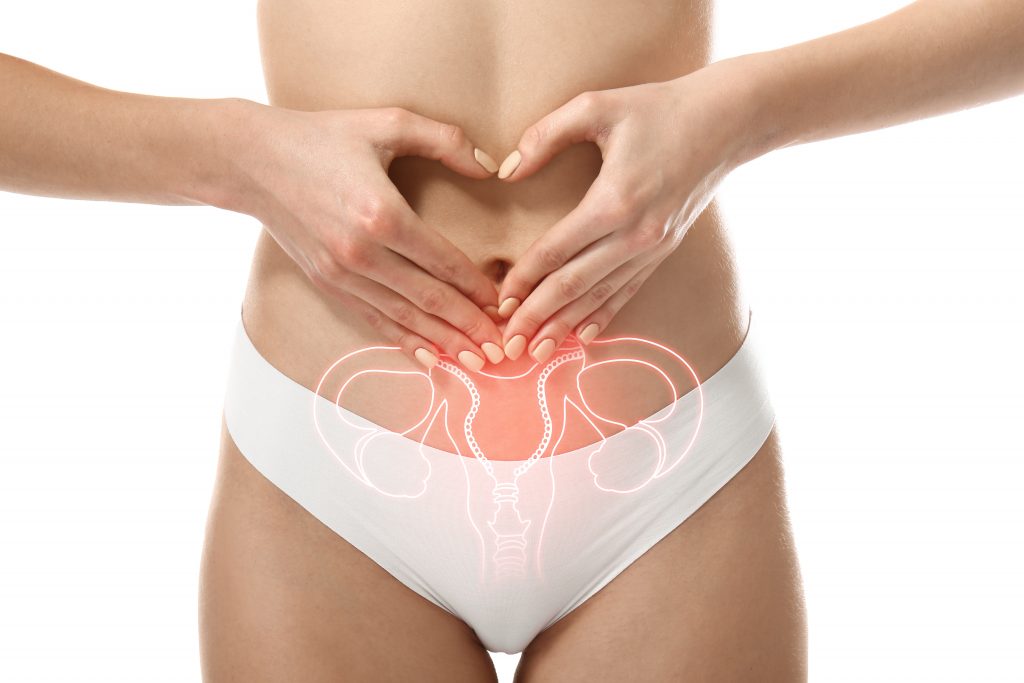What Causes Abnormal Uterine Bleeding During Premenopause or Perimenopause?
Posted By:

Dr. Michael Coyle, DO FACOOG, FPMRS

When the female reproductive system functions as it should, bleeding should be relatively predictable. Abnormal uterine bleeding (AUB), however, can mean bleeding irregularly or unpredictably, heavier than usual or lighter than usual. Causes of AUB can be anything from uterine fibroids to bleeding disorders. AUB during premenopause can have uniquely different causes than AUB at the onset of perimenopause or during menopause.
Abnormal Uterine Bleeding in Premenopausal Women
Premenopause is simply a term that means “before menopause,” even though you will often find the term incorrectly used interchangeably with perimenopause. Between adolescence and perimenopause (the transition into menopause), multiple conditions can cause abnormal uterine bleeding. Some AUB occurrences don’t signify a major event, while others can be much more concerning.
An example of a more common reason for AUB during premenopause is abrupt hormonal changes that occur during ovulation. This drastic variance can sometimes cause issues with unpredictable bouts of low-volume bleeding (also known as vaginal spotting). If you use hormonal birth control, abnormal uterine bleeding is also possible.
Irregular ovulation, which is possible throughout the premenopause years, can also lead to irregular, heavy or light bleeding. However, ovulating irregularly is more common during the first few years after menstruation starts and during the transition into menopause.
Even women who ovulate regularly or don’t ovulate at all (anovulation) can experience AUB, especially in terms of excessive bleeding either during periods or irregularly bleeding between periods. Common causes of this type of bleeding include:
- Uterine fibroids – Masses of benign tissue that grow in the myometrium (muscle of the uterus)
- Uterine adenomyosis – Endometrial lining grows into the myometrium
- Endometrial polyps – Typically benign, fleshy tissue growths that protrude into the cavity of the uterus
Other AUB causes during premenopause can include:
- Cervical or endometrial inflammation or infection
- Blood-clotting disorders, which can be related to taking blood thinners, blood platelet abnormalities, clotting factor issues and von Willebrand disease
- Certain medical illnesses, such as chronic kidney disease, liver disease and hypothyroidism
- Cancer of the cervix, vagina, uterus or ovaries
- Polycystic ovary syndrome (PCOS)
- Excessive weight gain or loss (greater than 10 pounds)
Contact Coyle Institute for an appointment to evaluate AUB.
Know your options and live the life you want.
Schedule an Appointment TodayAbnormal Uterine Bleeding for Women During Perimenopause
The perimenopause stage is a time of transition. Reproductive hormones fluctuate, ovulation is much less predictable, and the timing, duration and volume of flow of periods can change. In general, women are more likely to experience AUB during perimenopause than premenopause simply due to the natural changes that are taking place.
The ovaries tend to maintain estrogen production in the beginning stages, but the secretion of progesterone declines. This can mean noticeable changes in regular monthly cycles, but this also causes physiological changes that can contribute to AUB. Endometrium can grow, chances of endometrial hyperplasia increase and polyps become more likely. These physical developments can contribute to AUB.
Other conditions can be related to AUB during perimenopause as well, such as:
- Cancer of the uterus, ovaries, cervix or vagina
- Systemic illnesses
- Infections
During the menopausal transition, you still ovulate, even though ovulation may be less predictable. Therefore, pregnancy during perimenopause is possible and can be an underlying cause of AUB. Using hormonal birth control can also contribute to AUB during perimenopause.
During perimenopause, further evaluation may be even more important when AUB occurs because the root causes may be riskier to disregard. For example, age is a well-recognized factor in terms of endometrial cancer.
What About Abnormal Uterine Bleeding in Menopausal Women?
AUB after menopause is common but can also be more serious and should be assessed. Abnormal bleeding is especially possible for women who opt to use hormone replacement therapy (HRT). HRT can cause cyclical bleeding as a side effect.
Abnormal bleeding after menopause may be caused by:
- Blood thinner use
- Uterine infection
- Fibroids or polyps
- Hyperplasia of the uterine lining caused by cancer or precancer
- Excessive vaginal or uterine tissue atrophy or thinning related to low hormone levels
Treatment Options for Abnormal Uterine Bleeding at Coyle Institute
Treatment for AUB can vary depending on age and the suspected root cause of the condition. Several medicinal options may be used for premenopausal women to help with things like irregular or heavy bleeding, such as:
- Iron supplements to combat low iron levels during menstruation
- Ibuprofen or aspirin
- Hormonal birth control to lighten blood flow and support regularity
- HRT to stabilize hormone deficiencies
In some situations, surgical intervention is also recommended. For example, minimally invasive procedures like ablation or curettage to remove fibroids or polyps may help with heavy bleeding. In the most severe cases, a hysterectomy may be the best solution.
Whether you are dealing with AUB before menopause, during the transition or after, you can trust the professionals at Coyle Institute to help you make the best decisions about your care and treatment. Reach out today to schedule an appointment by calling 850-637-8258.
